北师大版(2019)选择性必修第一册Unit3 Conservation Lesson1 The Sixth Extinction语法课件(共14张PPT)
文档属性
| 名称 | 北师大版(2019)选择性必修第一册Unit3 Conservation Lesson1 The Sixth Extinction语法课件(共14张PPT) |
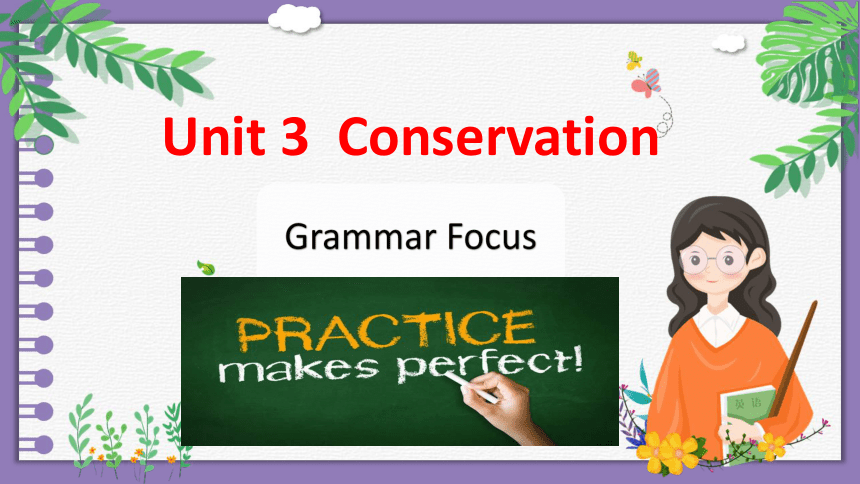
|
|
| 格式 | pptx | ||
| 文件大小 | 5.0MB | ||
| 资源类型 | 教案 | ||
| 版本资源 | 北师大版(2019) | ||
| 科目 | 英语 | ||
| 更新时间 | 2024-03-19 15:17:53 | ||
图片预览

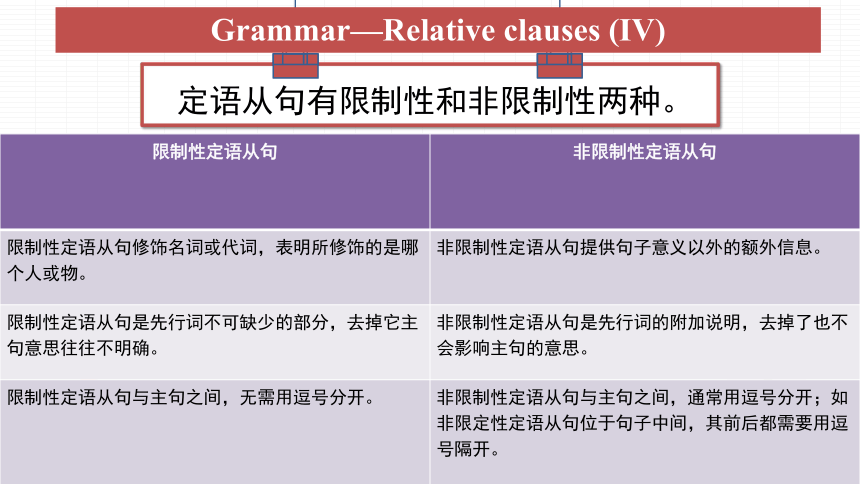
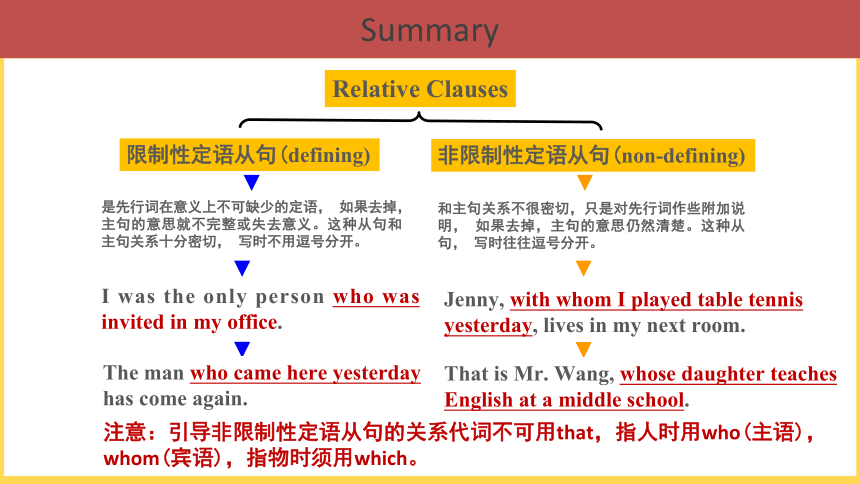
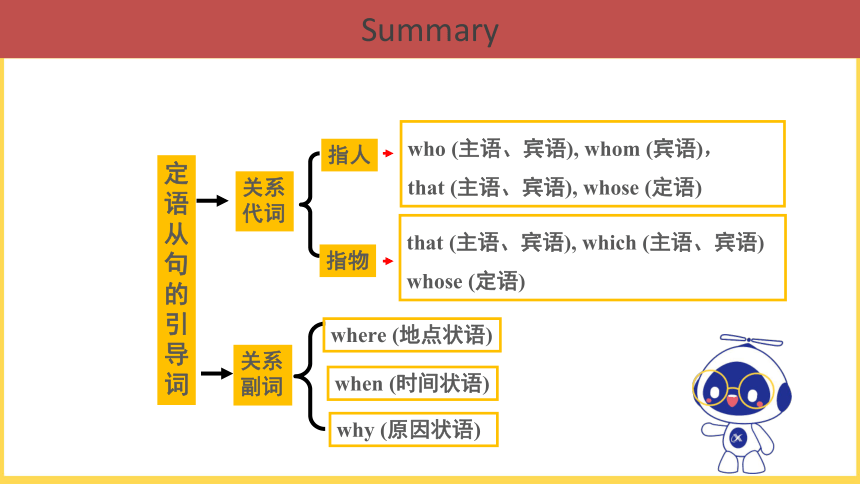
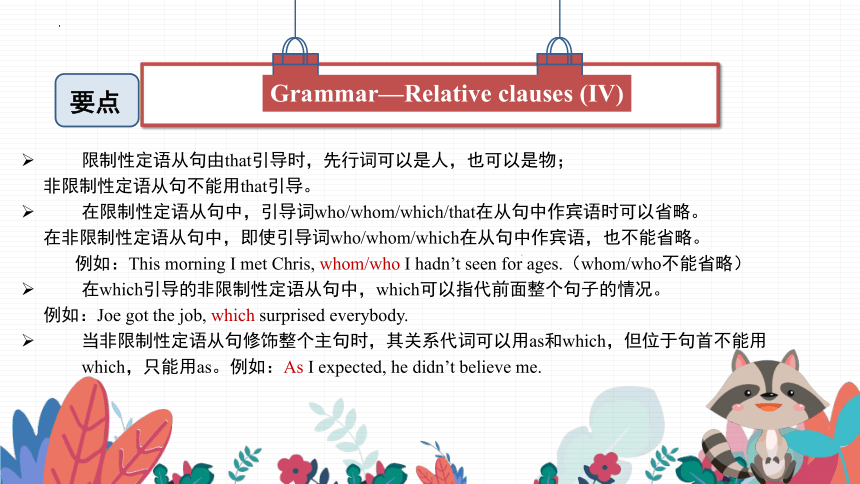
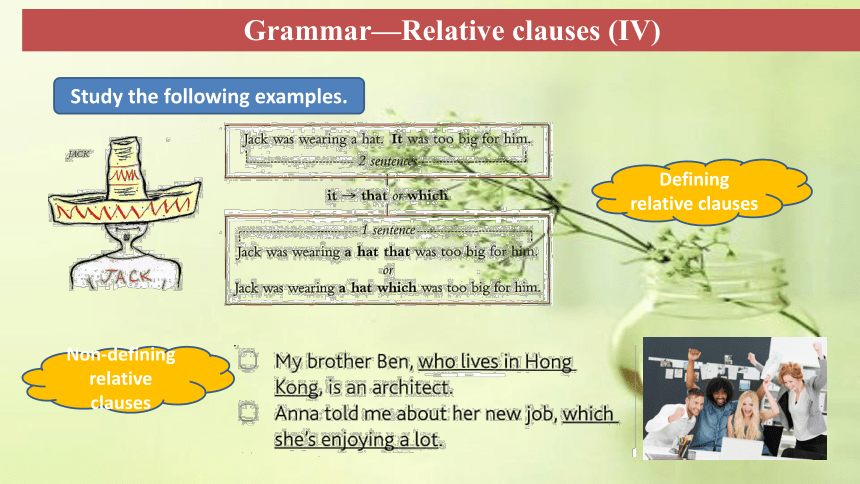
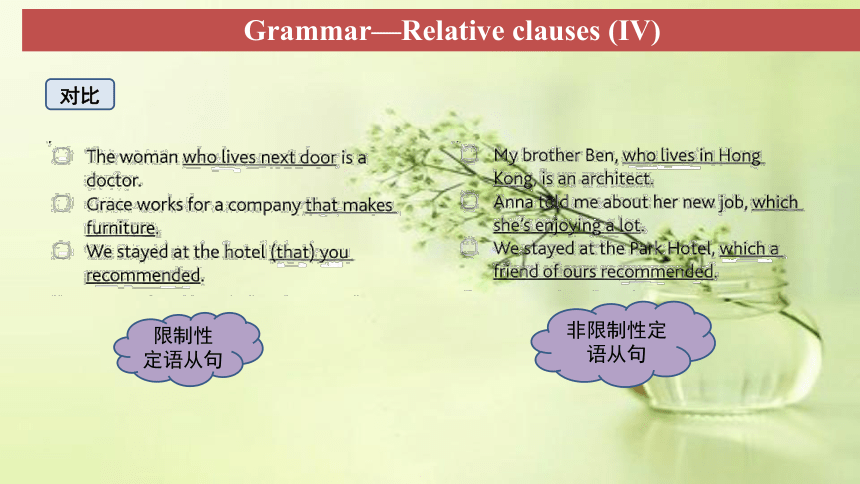
文档简介
(共14张PPT)
Unit 3 Conservation
Grammar Focus
Grammar—Relative clauses (IV)
定语从句有限制性和非限制性两种。
限制性定语从句 非限制性定语从句
限制性定语从句修饰名词或代词,表明所修饰的是哪个人或物。 非限制性定语从句提供句子意义以外的额外信息。
限制性定语从句是先行词不可缺少的部分,去掉它主句意思往往不明确。 非限制性定语从句是先行词的附加说明,去掉了也不会影响主句的意思。
限制性定语从句与主句之间,无需用逗号分开。 非限制性定语从句与主句之间,通常用逗号分开;如非限定性定语从句位于句子中间,其前后都需要用逗号隔开。
Relative Clauses
限制性定语从句(defining)
是先行词在意义上不可缺少的定语, 如果去掉,主句的意思就不完整或失去意义。这种从句和主句关系十分密切, 写时不用逗号分开。
I was the only person who was invited in my office.
The man who came here yesterday has come again.
非限制性定语从句(non-defining)
和主句关系不很密切,只是对先行词作些附加说明, 如果去掉,主句的意思仍然清楚。这种从句, 写时往往逗号分开。
Jenny, with whom I played table tennis
yesterday, lives in my next room.
That is Mr. Wang, whose daughter teaches English at a middle school.
注意:引导非限制性定语从句的关系代词不可用that,指人时用who(主语), whom(宾语),指物时须用which。
Summary
Summary
定
语
从
句
的
引
导
词
关系
代词
关系
副词
指人
who (主语、宾语), whom (宾语),
that (主语、宾语), whose (定语)
指物
that (主语、宾语), which (主语、宾语)
whose (定语)
where (地点状语)
when (时间状语)
why (原因状语)
限制性定语从句由that引导时,先行词可以是人,也可以是物;
非限制性定语从句不能用that引导。
在限制性定语从句中,引导词who/whom/which/that在从句中作宾语时可以省略。
在非限制性定语从句中,即使引导词who/whom/which在从句中作宾语,也不能省略。
例如:This morning I met Chris, whom/who I hadn’t seen for ages.(whom/who不能省略)
在which引导的非限制性定语从句中,which可以指代前面整个句子的情况。
例如:Joe got the job, which surprised everybody.
当非限制性定语从句修饰整个主句时,其关系代词可以用as和which,但位于句首不能用which,只能用as。例如:As I expected, he didn’t believe me.
Grammar—Relative clauses (IV)
要点
Grammar—Relative clauses (IV)
Study the following examples.
Defining
relative clauses
Non-defining relative clauses
对比
Grammar—Relative clauses (IV)
限制性
定语从句
非限制性定语从句
Practice
Underline the relative clauses in the sentences and decide if they are defining (D) or non-defining (ND). Translate them into Chinese.
( ) 1 He went to a city where iron was produced in huge quantities.
( ) 2 The bus which was full of tourists stopped near the Leaning Tower
of Pisa.
( ) 3 Melissa lent me some money, which was very generous of her.
( ) 4 The ground is covered with snow and ice, which makes driving very
dangerous.
( ) 5 I met the famous professor in the hotel, where the meeting was held.
ND
ND
ND
D
D
Use proper relative pronouns/adverbs to complete the following sentences.
1 The library ________ students often study was on fire last night.
2 The library, _______ was built in the 1930s, needs repairing.
3 The library ________ you visited yesterday was built in 1990.
4 The woman, ________ husband had recently travelled to Wuhan, was tested positive for the infection.
5 This is the room, _______ door was broken yesterday.
where
which
which
whose
whose
Practice
6 We will never forget the day _______ the people were prevented from leaving and entering Wuhan, the central Chinese city, ______ the novel coronavirus first emerged last month.
7 The specialists and medical workers are making all their efforts to find out the reasons ________ NCP (新冠肺炎) broke out.
8 There were also popular videos on different social media platforms, _______ people are showing their daily exercise routine.
where
why
where
when
Practice
Grammar
限制性定语从句由that引导时,先行词可以是人,也可以是物;
非限制性定语从句不能用that引导。
在限制性定语从句中,引导词who/whom/which/that在从句中作宾语时可以省略。
在非限制性定语从句中,即使引导词who/whom/which在从句中作宾语,也不
能省略。例如:This morning I met Chris, whom/who I hadn’t seen for ages.
(whom/who不能省略)
在which引导的非限制性定语从句中,which可以指代前面整个句子的情况。
例如:Joe got the job, which surprised everybody.
当非限制性定语从句修饰整个主句时,其关系代词可以用as和which,但位于句首不能用which,只能用as。
例如:As I expected, he didn’t believe me.
Complete each sentence using the appropriate relative words.
Practice
1. What’s the name of the man ______ car you borrowed
2. It is snowing heavily, ______ makes children feel excited.
3. Who is the person to ______ you spoke on the phone
4. The place ______ we spent our holidays was really beautiful.
5. ______ I expected, he got the first place again in this examination.
6. Have you found the keys ___________ you lost
7. Alaska, ______ my brother lives, is the largest state in the USA.
8. Sunset is defined as the moment ______ the whole of the sun’s disc
disappears below the horizon.
whose
which
whom
where
As
which/that
where
when
Assignment
Write down your group discussion by using appropriate relative clauses and newly-learnt expressions. Share your writing online.
Thank You !
Unit 3 Conservation
Grammar Focus
Grammar—Relative clauses (IV)
定语从句有限制性和非限制性两种。
限制性定语从句 非限制性定语从句
限制性定语从句修饰名词或代词,表明所修饰的是哪个人或物。 非限制性定语从句提供句子意义以外的额外信息。
限制性定语从句是先行词不可缺少的部分,去掉它主句意思往往不明确。 非限制性定语从句是先行词的附加说明,去掉了也不会影响主句的意思。
限制性定语从句与主句之间,无需用逗号分开。 非限制性定语从句与主句之间,通常用逗号分开;如非限定性定语从句位于句子中间,其前后都需要用逗号隔开。
Relative Clauses
限制性定语从句(defining)
是先行词在意义上不可缺少的定语, 如果去掉,主句的意思就不完整或失去意义。这种从句和主句关系十分密切, 写时不用逗号分开。
I was the only person who was invited in my office.
The man who came here yesterday has come again.
非限制性定语从句(non-defining)
和主句关系不很密切,只是对先行词作些附加说明, 如果去掉,主句的意思仍然清楚。这种从句, 写时往往逗号分开。
Jenny, with whom I played table tennis
yesterday, lives in my next room.
That is Mr. Wang, whose daughter teaches English at a middle school.
注意:引导非限制性定语从句的关系代词不可用that,指人时用who(主语), whom(宾语),指物时须用which。
Summary
Summary
定
语
从
句
的
引
导
词
关系
代词
关系
副词
指人
who (主语、宾语), whom (宾语),
that (主语、宾语), whose (定语)
指物
that (主语、宾语), which (主语、宾语)
whose (定语)
where (地点状语)
when (时间状语)
why (原因状语)
限制性定语从句由that引导时,先行词可以是人,也可以是物;
非限制性定语从句不能用that引导。
在限制性定语从句中,引导词who/whom/which/that在从句中作宾语时可以省略。
在非限制性定语从句中,即使引导词who/whom/which在从句中作宾语,也不能省略。
例如:This morning I met Chris, whom/who I hadn’t seen for ages.(whom/who不能省略)
在which引导的非限制性定语从句中,which可以指代前面整个句子的情况。
例如:Joe got the job, which surprised everybody.
当非限制性定语从句修饰整个主句时,其关系代词可以用as和which,但位于句首不能用which,只能用as。例如:As I expected, he didn’t believe me.
Grammar—Relative clauses (IV)
要点
Grammar—Relative clauses (IV)
Study the following examples.
Defining
relative clauses
Non-defining relative clauses
对比
Grammar—Relative clauses (IV)
限制性
定语从句
非限制性定语从句
Practice
Underline the relative clauses in the sentences and decide if they are defining (D) or non-defining (ND). Translate them into Chinese.
( ) 1 He went to a city where iron was produced in huge quantities.
( ) 2 The bus which was full of tourists stopped near the Leaning Tower
of Pisa.
( ) 3 Melissa lent me some money, which was very generous of her.
( ) 4 The ground is covered with snow and ice, which makes driving very
dangerous.
( ) 5 I met the famous professor in the hotel, where the meeting was held.
ND
ND
ND
D
D
Use proper relative pronouns/adverbs to complete the following sentences.
1 The library ________ students often study was on fire last night.
2 The library, _______ was built in the 1930s, needs repairing.
3 The library ________ you visited yesterday was built in 1990.
4 The woman, ________ husband had recently travelled to Wuhan, was tested positive for the infection.
5 This is the room, _______ door was broken yesterday.
where
which
which
whose
whose
Practice
6 We will never forget the day _______ the people were prevented from leaving and entering Wuhan, the central Chinese city, ______ the novel coronavirus first emerged last month.
7 The specialists and medical workers are making all their efforts to find out the reasons ________ NCP (新冠肺炎) broke out.
8 There were also popular videos on different social media platforms, _______ people are showing their daily exercise routine.
where
why
where
when
Practice
Grammar
限制性定语从句由that引导时,先行词可以是人,也可以是物;
非限制性定语从句不能用that引导。
在限制性定语从句中,引导词who/whom/which/that在从句中作宾语时可以省略。
在非限制性定语从句中,即使引导词who/whom/which在从句中作宾语,也不
能省略。例如:This morning I met Chris, whom/who I hadn’t seen for ages.
(whom/who不能省略)
在which引导的非限制性定语从句中,which可以指代前面整个句子的情况。
例如:Joe got the job, which surprised everybody.
当非限制性定语从句修饰整个主句时,其关系代词可以用as和which,但位于句首不能用which,只能用as。
例如:As I expected, he didn’t believe me.
Complete each sentence using the appropriate relative words.
Practice
1. What’s the name of the man ______ car you borrowed
2. It is snowing heavily, ______ makes children feel excited.
3. Who is the person to ______ you spoke on the phone
4. The place ______ we spent our holidays was really beautiful.
5. ______ I expected, he got the first place again in this examination.
6. Have you found the keys ___________ you lost
7. Alaska, ______ my brother lives, is the largest state in the USA.
8. Sunset is defined as the moment ______ the whole of the sun’s disc
disappears below the horizon.
whose
which
whom
where
As
which/that
where
when
Assignment
Write down your group discussion by using appropriate relative clauses and newly-learnt expressions. Share your writing online.
Thank You !
同课章节目录
- Unit 1 Relationshis
- Lesson 1 Teachers
- Lesson 2 How Do We Like Teachers’ Feedback?
- Lesson 3 So Close,Yet So Fa
- Unit 2 Success
- Lesson 1 Money vs Success
- Lesson 2 Top Five Secrets of Success
- Lesson 3 Getting to the Top
- Unit 3 Conservation
- Lesson 1 The Sixth Extinction
- Lesson 2 War on Plastic Packets
- Lesson 3 The Road to Destruction
